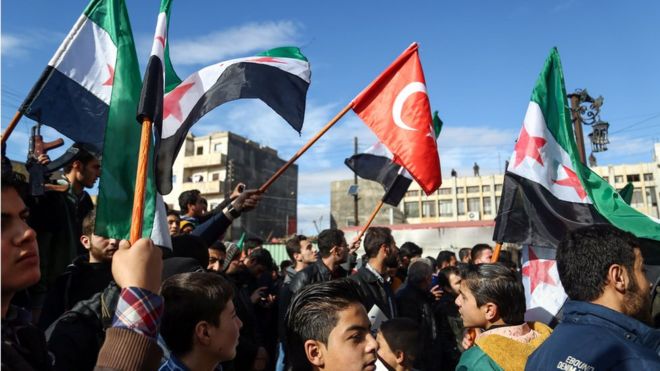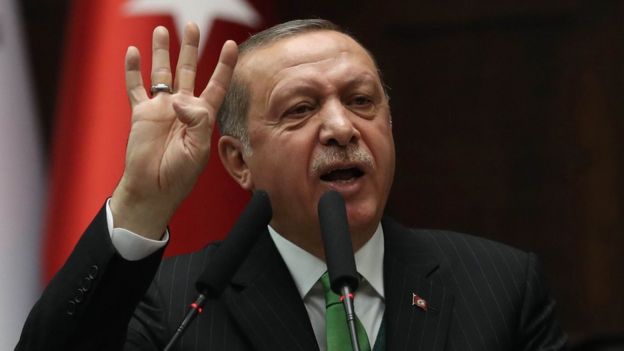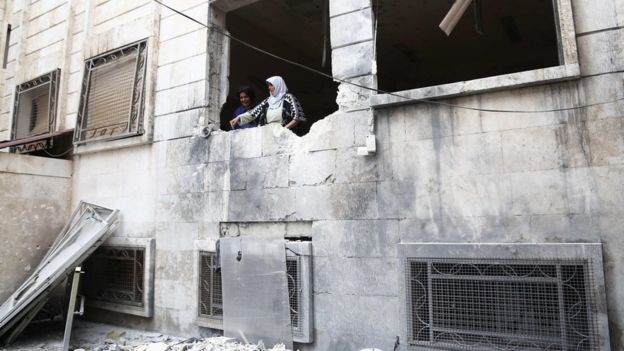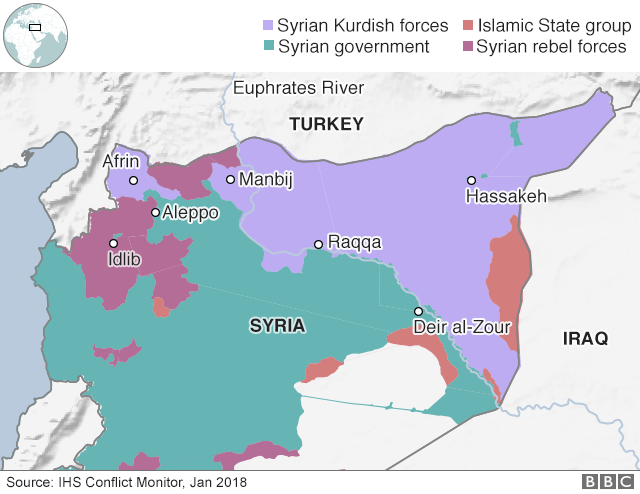 |
| Syrian supporters of Turkey's operation against Kurdish forces rallied in the town of Azaz on Friday |
Turkish President Recep Tayyip Erdogan says that a ground operation against Kurdish forces in Syria has begun "de-facto" after two days of shelling.
Turkey has threatened a full military operation to oust Kurdish fighters from Afrin region, held by them since 2012.
Syria, meanwhile, has warned against any operation and said it would shoot down Turkish planes.
Mr Erdogan did not clarify if his "de facto" comment meant troops had crossed the border.
He may have been mirroring the language used earlier by Turkish Defence Minister Nurettin Canikli, who said the shelling was the "de-facto start" of a planned invasion of Afrin.
The president also threatened to strike at the city of Manbij - some 100km away from Afrin in another Kurdish area - as a next target.
Meanwhile, Russia - a key military figure in the region - says it will not interfere in any conflict in Afrin.
What did Mr Erdogan say?
The Kurdish YPG (Syrian Kurdish People's Protection Units) has been a key part of the battle against the group calling itself the Islamic State in Syria, and has been backed by the United States.
But speaking at a meeting of his ruling AKP party, Mr Erdogan once again linked the YPG and other Syrian Kurdish groups to the Turkish PKK, an insurgent group considered a terrorist organisation by Turkey.
 |
| Mr Erdogan claimed several Kurdish groups had terrorist links - something the US-backed groups deny |
"The PKK, YPG, PYD are all the same; changing names does not change the fact that they are terror organisations," Turkey's Anadolu news agency quoted him as saying.
What has happened so far?
The Turkish military started artillery shelling of the Afrin region on Thursday, saying it was responding to fire coming from the area.
However, Turkey has been threatening to clear Kurdish fighters from both Afrin and Manbij for several months.
Its plans seem to have been accelerated by an announcement from the United States that it would help the Syrian Democratic Forces (SDF) - an alliance against IS of which the YPG is a member - build a new "border security force" to prevent the return of IS.
Turkey reacted angrily, with President Erdogan calling the border force a "terror army". The YPG and SDF deny any terrorist links - a claim backed by the US government.
 |
| Syrians inspect a psychiatric hospital damaged by a mortar in nearby rebel-held Azaz |
The YPG says the Afrin region has been hit by dozens of artillery shells since Thursday.
Rizan Habou, of the Syrian Democratic Council in Afrin, told BBC Arabic that residents were seeking shelter.
"When the villages in Afrin are shelled, the civilians [including] women and children are forced to leave their houses and go to the relatively safer surrounding open space and farmland till the shelling stops," he said.
"The YPG and the civilians will defend Afrin to the last moment."

Afrin is isolated from two other self-declared Kurdish autonomous cantons - Kobani and Jazira.
Turkish-backed rebel forces took over a 100km (60-mile) area separating the territories after driving out IS in 2016 - so driving out Kurdish fighters would significantly expand Turkey's area of control in the region.
What about Russia?
On Saturday, Russia announced it was not going to involve itself in the conflict.
Russian senator Frants Klintsevich told Interfax news agency that Moscow will not interfere in a conflict in Afrin, and will respond only if it threatens Russian bases in Syria.
Turkey's military and intelligence chiefs had been trying to get Russia's agreement to allow Turkish planes to use the Russian-controlled airspace above Afrin.
Such consent is seen as essential for any Turkish operation. Moscow is a key ally of Syrian President Bashar al-Assad and has a contingent of soldiers at the airport in the centre of Afrin.
It is not yet clear if Russia's claim that it will not interfere precludes allowing use of its airspace.
On Friday, Turkey's Anadolu news agency reported that Russian military personnel in Afrin were leaving in groups - but Russian Foreign Minister Sergei Lavrov later denied the reports.
The US State Department, meanwhile, said: "We do not believe that a military operation... serves the cause of regional stability, Syrian stability, or indeed Turkish concerns about the security of their border."
Source: BBCNews

No comments:
Post a Comment
Add a Comment...